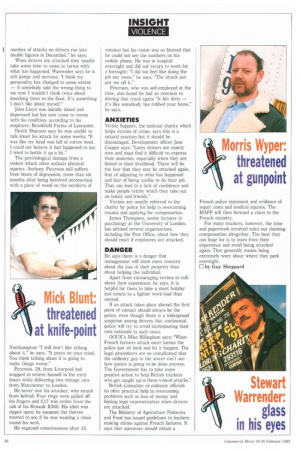Mick Blunt: threatened at knife-point
Page 38

If you've noticed an error in this article please click here to report it so we can fix it.
Northampton: "I still don't like talking about it," he says. "It preys on your mind. You think talking about it is going to make things worse."
Peterson, 28, from Liverpool had stopped to relieve himself in the early hours while delivering two vintage cars from Manchester to London.
He never saw his attacker, who struck from behind. Four rings were pulled off his fingers and £17 was stolen from the cab of his Renault R340. His shirt was ripped open; he assumes the thieves wanted to see if he was wearing a chain round his neck, He regained consciousness after 15 minutes but his vision was so blurred that he could not see the numbers on his mobile phone. He was in hospital overnight and did not return to work for a fortnight: "I did not feel like doing the job any more," he says. "The attack just put me off it."
Peterson, who was self-employed at the time, also found he had an aversion to driving that truck again: "It felt dirty — it's like somebody has robbed your home," he says.
ANXIETIES
Victim Support, the national charity which helps victims of crime, says this is a natural reaction but it should be discouraged. Development officer Jane Cooper says: "Lorry drivers are mainly men and must find it difficult to express their anxieties, especially when they are linked to their livelihood. There will be the fear that they may be attacked again, fear of adjusting to what has happened and fear of being unable to do their job. That can lead to a lack of confidence and make people tetchy which they take out on family and friends."
Victims are usually referred to the charity by police for help in overcoming trauma and applying for compensation.
James Thompson, senior lecturer in psychology at the University of London, has advised several organisations, including the Post Office, about how they should react if employees are attacked.
DANGER
He says there is a danger that management will show more concern about the loss of their property than about helping the individual.
Apart from encouraging victims to talk about their experience, he says, it is helpful for them to take a short holiday and return to a lighter work-load than normal.
If an attack takes place abroad the first point of contact should always be the police, even though there is a widespread suspicion among drivers that continental police will try to avoid incriminating their own nationals in such cases.
001.3K's Mike Billingham says: "When French farmers attack meat lorries the police just sit back and let it happen. The legal procedures are so complicated that the ordinary guy in the street can't see how justice is going to be done anyway. The Government has to take more positive action to help British truckers who get caught up in these violent attacks."
British Consulate or embassy officials do offer practical help in overcoming problems such as loss of money and finding legal representation when drivers are attacked.
The Ministry of Agriculture Fisheries and Food has issued guidelines to hauliers making claims against French farmers. It says that operators should obtain a




















































































